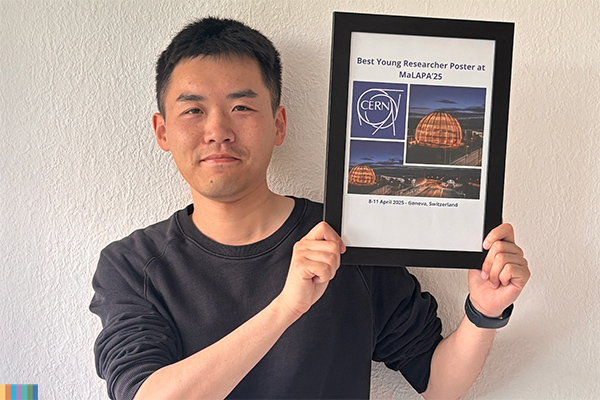Best Young Researcher Poster at MaLAPA'25

Qiyuan Xu, a second-year PhD student at the University of Liverpool’s Department of Physics, affiliated with the QUASAR Group and the LIV.INNO CDT, was awarded the "Best Young Researcher Poster" at the Machine Learning Applications for Particle Accelerators (MaLAPA'25) workshop held last week at CERN.
Qiyuan's research, titled "Developing Radiation-Tolerant Transverse Beam Imaging Using Synthetic Data and Multimode Fiber," focuses on developing a radiation-tolerant imaging system for accelerator beam diagnostics. The idea of his approach is to transmit a 2D light signal, generated when a particle beam interacts with a scintillating screen, through a multimode fiber to a low-radiation area. At this safer location, a standard camera would capture the fiber’s output, and a machine learning model trained exclusively on synthetic data would reconstruct the original beam image. Current experimental results, obtained using real beam transverse distribution images displayed via a laser-illuminated Digital Micromirror Device (DMD) and relayed with the proposed system, demonstrate the method's accuracy and generalization capabilities for reconstruction.
The award was presented during the "5th ICFA Beam Dynamics Mini-Workshop" held at CERN's Globe of Science and Innovation from April 8 to 11, 2025. The event attracted more than 100 participants from international institutes and featured over 40 talks and 60 poster presentations.
Reflecting on the event, Qiyuan remarked, "It was very inspiring to see such diverse and meaningful applications of machine learning in accelerator science. Researchers presented work dealing with different types of data, from images to time series, and used various AI techniques ranging from reinforcement learning for control systems to machine learning models solving complex optimization problems. The workshop was also a great opportunity to connect with others and learn more about their exciting research."
More information about MaLAPA workshops can be found here: https://malapa.org/workshops